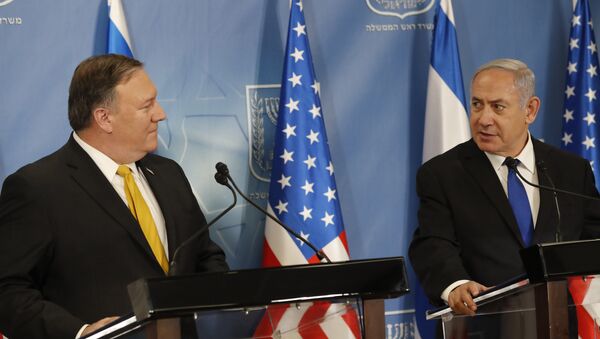Sputnik spoke to Virginia Tilley, a professor of political science at Southern Illinois University at Carbondale, to discover why the minister decided to mention this issue now.
READ MORE: US Lawmakers Push Resolution to Recognise Israeli Sovereignty Over Golan Heights
Sputnik: In your view, why did the minister decide to mention this plan now?
Virginia Tilley: The timing is the only interesting part of this "plan." The most likely reason for it is that Israel is trying to pacify some tensions on its domestic front in preparation for open conflict with Iran. This is highly unlikely to work, because the US and even the Israeli government consistently underestimate Palestinian national determination to reject "solutions" that promise only continued subordination. But it may be that Kushner's ignorance and bias will allow him to try. For outsiders, the main meaning of this announcement could be that some aggression regarding Iran is looming.
Sputnik: How likely is it that this plan will be accepted by the Palestinian government?
Virginia Tilley: Until we see the plan, it's unwise to speculate too much. But it's unimaginable that Kushner and the Israeli government will present any plan that provides the Palestinians with a truly sovereign and viable Palestinian state. Israel would never tolerate such a capitulation and has no motive to do so, as the PA is presently very weak and Israel is under no serious diplomatic pressure from any party to do anything it does not want to do. We can therefore safely assume there is no chance of this plan's providing for the self-determination of the Palestinian people and, accordingly, there is no chance of its being accepted by the PA.
READ MORE: Rouhani Blames 'Enemies' Israel, US For Trying to Create Division Among Iranians
Sputnik: What impact can this proposal have on Israeli- Palestinian relations?
Virginia Tilley: Regarding a two-state solution, none. The chances are zero that Kushner's plan will "divide Jerusalem" or provide the Palestinians with true sovereignty over any part of the West Bank (including East Jerusalem). The plan can have no diplomatic impact, either. Assuming it proposes a "solution" the Palestinians cannot accept, the PA will reject the plan, as usual. Israel will then accuse the Abbas and the PA of being irrationally rejectionist, as usual. The rest of the world will be unimpressed and unconvinced by Israel's claim, but take no action on it, as usual.
References in some media coverage to a "borders" proposal are too vague to analyze, but we can assume that any recommendation about borders emanating from Kushner will allow Israel to absorb more land. However, Kushner has suggested that his border proposal will relieve some economic stress on the Palestinian sector. This may mean dissolving some Area A borders that are presently operating to segregate Palestinian society from the Jewish-Israeli sector. Such a gesture at greater economic integration would clarify Israel's annexation strategy and force more people finally to recognize and admit that a two-state solution must be abandoned. In other words, the only significant possibility that this plan will have any meaningful impact at all would emerge from how it drives another nail into the coffin of the two-state solution.
Virginia Tilley: Not having seen the plan yet, we can't assess their reaction. We can only assume that the right wing parties would reject any division of Jerusalem or any transfer of land to a Palestinian state. But since the plan will not propose this, for reasons noted earlier, I don't expect it to be an issue.
Sputnik: Do you expect this announcement to have any influence on Benjamin Netanyahu in the upcoming elections? If yes then what?
Virginia Tilley: Although Bennett's claims about this plan are causing some consternation among the Israel's Zionist right-wing parties, their back-channel communications with Netanyahu will doubtless lay these fears to rest. I don't see Netanyahu having serious trouble cultivating his right-wing constituency just because Kushner has waltzed into the scene with a badly cooked peace proposal.
However, I do encourage observers concerned with Middle East peace not to obsess about "left wing" and "right wing" in Israeli politics. Although their extreme wings have different rhetorical styles, political views all across the Israeli political spectrum are largely identical regarding the Palestinian problem.
The solution to Israeli-Palestinian problem is not to be found in US-sponsored plans. It will emerge from the people, when they insist on having their full rights as equal citizens in one country. The principal obstacle to that, presently, is international obsession with these periodic and always useless US-sponsored "plans."
The views and opinions expressed by the speaker do not necessarily reflect those of Sputnik.


